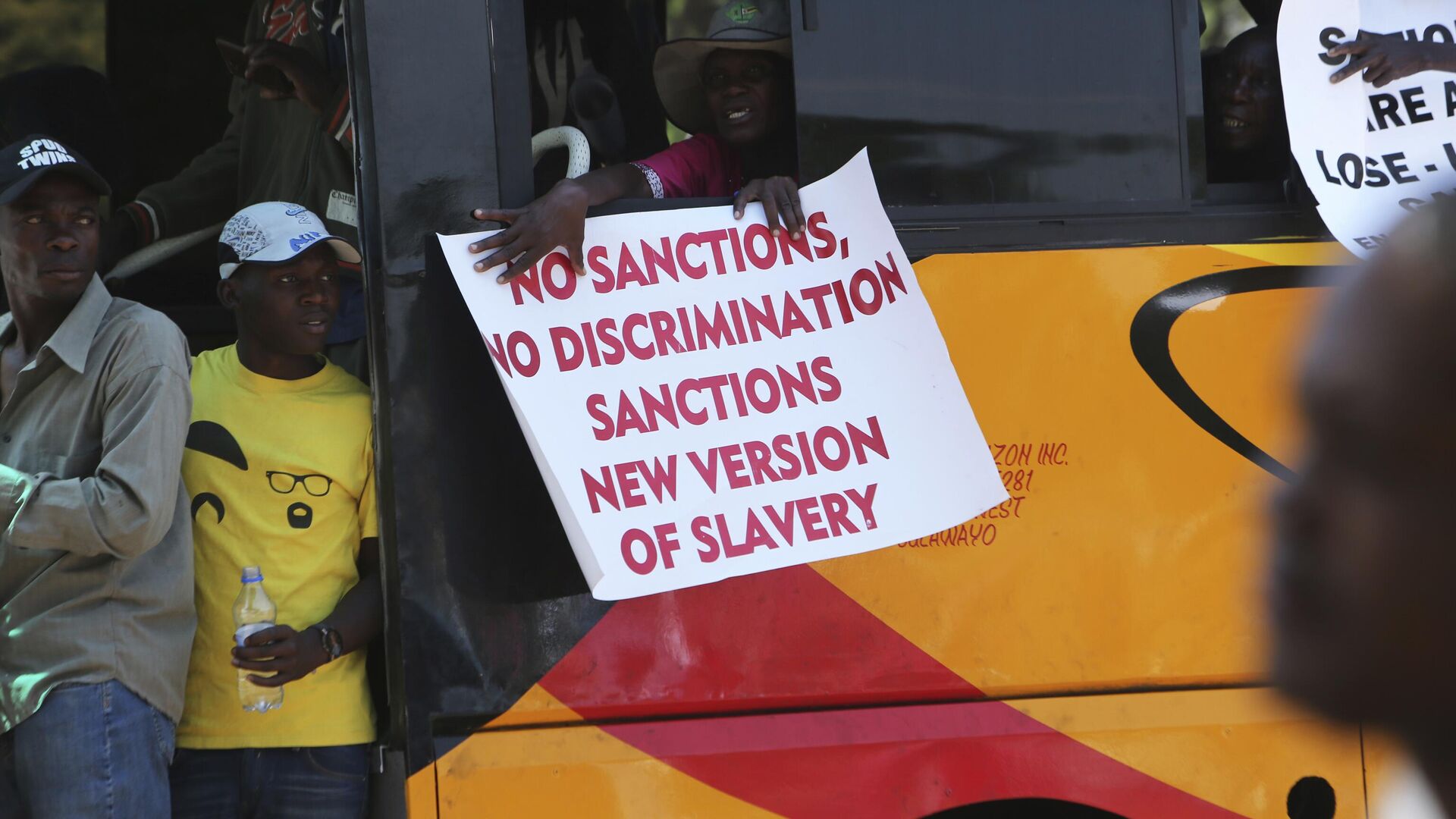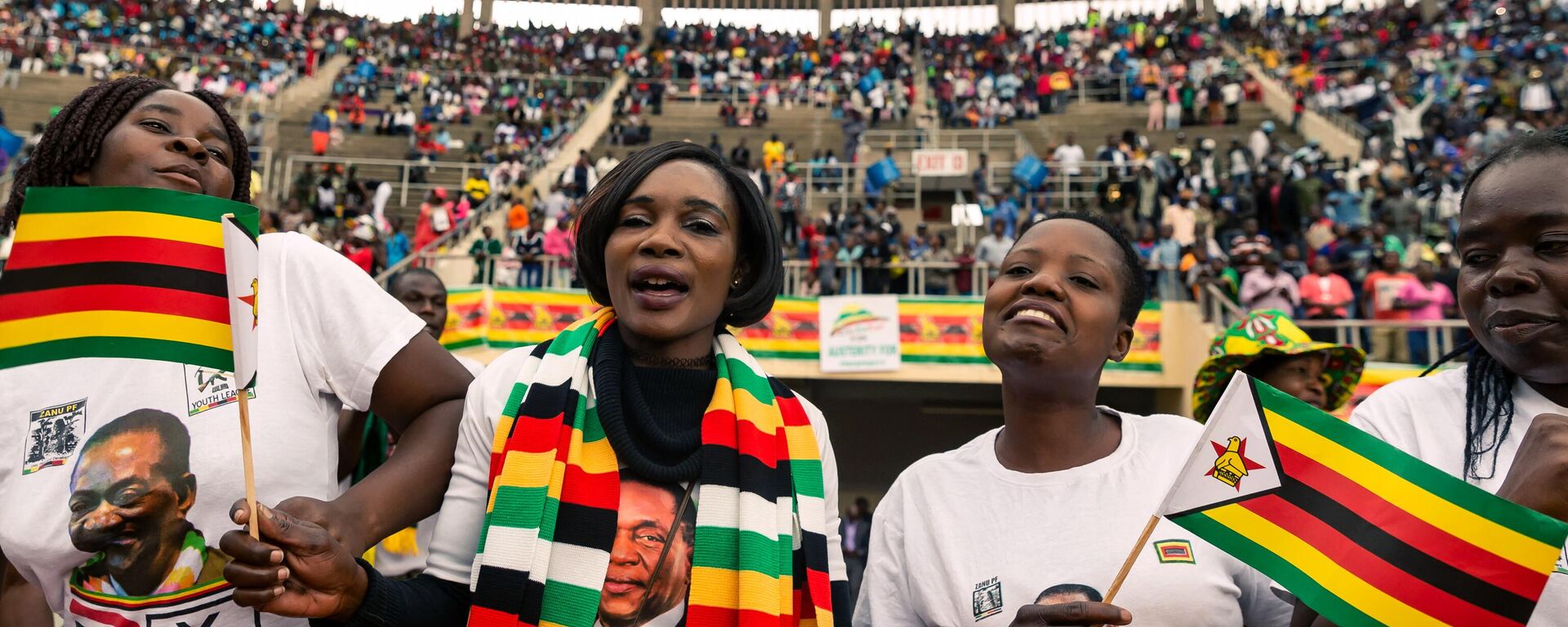https://en.sputniknews.africa/20231025/sadc-au-calling-for-lifting-of-sanctions-against-zimbabwe-on-anti-sanctions-day-1063061728.html
SADC, AU Calling For Lifting of Western Sanctions Against Zimbabwe on Anti-Sanctions Day
SADC, AU Calling For Lifting of Western Sanctions Against Zimbabwe on Anti-Sanctions Day
Sputnik Africa
In 2019, the Southern African Development Community (SADC) declared October 25 “Anti-Sanctions Day” in a move to protest unilateral restrictions imposed... 25.10.2023, Sputnik Africa
2023-10-25T09:11+0200
2023-10-25T09:11+0200
2023-10-25T09:12+0200
sub-saharan africa
zimbabwe
southern africa development community (sadc)
martin zharare
angola
united states (us)
african union (au)
european union (eu)
moussa faki
joao manuel gonсalves lourenсo
https://cdn1.img.sputniknews.africa/img/07e7/05/1f/1059608179_0:160:3072:1888_1920x0_80_0_0_2d1e5c492a5d962e31ebf9f3dcdb02ad.jpg
As the world marks the fifth anniversary of the Anti-Sanctions Day, SADC along with the African Union called for lifting of all sanctions imposed on the Republic of Zimbabwe, reaffirming its "unwavering solidarity with the Government and People of the Republic of Zimbabwe."The appeal for "immediate" lifting of Western sanctions "rests on the backdrop of growing concern over the impact these sanctions continue to pose on the country and the SADC region," and is made "as a firm request to the International Community for a new rhetoric, story, and direction for the country."Lifting on sanctions "shall create the conditions for Zimbabwe and the SADC region to consolidate its collective efforts to spearhead national and regional growth and substantively develop in critical areas of good governance, human rights, and social cohesion."The SADC's call for lifting of the West imposed unilateral sanctions was supported by the African Union Commission's Chairperson Moussa Faki Mahamat, who reiterated "the longstanding AU demand for the immediate and unconditional lifting of sanctions."The AU Commission's Chairman, while "acknowledging subsequent engagement with the European Union through political dialogue, as encouraging," raised concerns over "the negative impact the sanctions continue to have on Zimbabwe's socio-economic development amid the current global food and energy crises, including post Covid-19 recovery efforts."Zimbabwe has been under harsh Western sanctions since the 2000s over alleged "human rights violations." Harare has denied the allegations on multiple occasions. According to the 2022 the UN Human Rights Council's report, Zimbabwe has lost over $42 billion in revenue over the past 19 years, which includes "lost bilateral donor support estimated at $4.5 billion annually since 2001, $12 billion in loans from the International Monetary Fund, the World Bank and African Development Bank, commercial loans of $18 billion and a GDP reduction of $21 billion."Martin Zharare, the executive director of Citizens Against Economic Sanctions (CAES), an organization that advocates for the lifting of restrictions to ease the burden on the Zimbabwean people, pointed to the significant impact that Western sanctions has on the lives of ordinary Zimbabweans in an interview with Sputnik Africa earlier this year.
https://en.sputniknews.africa/20230418/brutal-coercive-expert-recalls-colonialism-as-zimbabwe-celebrates-independence-day-1058687508.html
zimbabwe
angola
united states (us)
Sputnik Africa
feedback@sputniknews.com
+74956456601
MIA „Rossiya Segodnya“
2023
Sputnik Africa
feedback@sputniknews.com
+74956456601
MIA „Rossiya Segodnya“
News
en_EN
Sputnik Africa
feedback@sputniknews.com
+74956456601
MIA „Rossiya Segodnya“
Sputnik Africa
feedback@sputniknews.com
+74956456601
MIA „Rossiya Segodnya“
zimbabwe, southern africa development community (sadc), martin zharare, angola, united states (us), african union (au), european union (eu), moussa faki, joao manuel gonсalves lourenсo
zimbabwe, southern africa development community (sadc), martin zharare, angola, united states (us), african union (au), european union (eu), moussa faki, joao manuel gonсalves lourenсo
SADC, AU Calling For Lifting of Western Sanctions Against Zimbabwe on Anti-Sanctions Day
09:11 25.10.2023 (Updated: 09:12 25.10.2023) In 2019, the Southern African Development Community (SADC) declared October 25 “Anti-Sanctions Day” in a move to protest unilateral restrictions imposed against Zimbabwe by the United States and the EU.
As the world marks the fifth anniversary of the Anti-Sanctions Day, SADC along with the African Union called for lifting of all sanctions imposed on the Republic of Zimbabwe, reaffirming its "unwavering solidarity with the Government and People of the Republic of Zimbabwe."
"As a Regional Family, SADC firmly echoes that the targeted sanctions geared at a few individuals in Zimbabwe adversely impact the country. It is now over twenty years since the imposition of these targeted sanctions – two decades marred by the inability of the people of Zimbabwe to fully achieve their potentials across various sectors as a nation," João Manuel Gonçalves Lourenço, President of the Republic of Angola and the Chairperson of SADC, said in a statement.
The appeal for "immediate" lifting of
Western sanctions "rests on the backdrop of growing concern over the impact these sanctions continue to pose on the country and the SADC region," and is made "as a firm request to the International Community for a new rhetoric, story, and direction for the country."
"This reality, which is not new to the International Community, damages Zimbabwe’s image and limits its potential for access to financial and capital markets. The extent of this block to Zimbabwe’s socio-economic growth on the livelihood of its people represents a modern-day atrocity which we, as the SADC Family, strongly feel is an impediment that leaves one of our Members behind from our common quest for regional integration, growth and prosperity," the statement read.
Lifting on
sanctions "shall create the conditions for Zimbabwe and the SADC region to consolidate its collective efforts to spearhead national and regional growth and substantively develop in critical areas of good governance, human rights, and social cohesion."
"In a time where global insecurities pose Food Security and other pertinent challenges to the African Continent and SADC Region, the sanctions imposed on the Republic of Zimbabwe create an alarming double-imposed threat to its peoples’ livelihood and survival. As SADC, we remain welcoming to support, through the necessary means, the earnest lifting of sanctions on the Republic of Zimbabwe and trust that the humanity we share as the global community shall guide the relevant move in this direction by all relevant actors through tangible actions," according to the statement.
The SADC's call for lifting of the West imposed
unilateral sanctions was supported by the African Union Commission's Chairperson Moussa Faki Mahamat, who reiterated "the longstanding AU demand for the immediate and unconditional lifting of sanctions."
"The African Union associates itself with the statement made by President João Gonçalves Lourenço, President of the Republic of Angola and current Chairperson of SADC on the subject," a statement issued by the AU Commission's Chairman read.
The AU Commission's Chairman, while "acknowledging subsequent engagement with the European Union through political dialogue, as encouraging," raised concerns over "the negative impact the sanctions continue to have on Zimbabwe's socio-economic development amid the current global food and energy crises, including post Covid-19 recovery efforts."
Moussa Faki Mahamat has called on "all parties to continue dialogue with the view to end all remaining sanctions against Zimbabwe," and reaffirmed "the continued commitment of the African Union to support the brotherly nation of Zimbabwe in mobilising efforts for the complete lifting of all remaining sanctions."
Zimbabwe has been under harsh Western sanctions since the 2000s over alleged "human rights violations." Harare has denied the allegations on multiple occasions.
According to the 2022 the UN Human Rights Council's report, Zimbabwe has lost over $42 billion in revenue over the past 19 years, which includes "lost bilateral donor support estimated at $4.5 billion annually since 2001, $12 billion in loans from the International Monetary Fund, the World Bank and African Development Bank, commercial loans of $18 billion and a GDP reduction of $21 billion."
Martin Zharare, the executive director of Citizens Against Economic Sanctions (CAES), an organization that advocates for the lifting of restrictions to ease the burden on the Zimbabwean people, pointed to the significant impact that Western sanctions has on the lives of ordinary Zimbabweans in an
interview with Sputnik Africa earlier this year.


